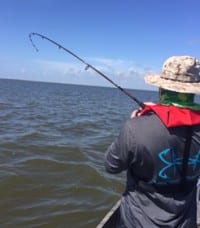 By Bob Currie, Vessel Examiner
By Bob Currie, Vessel Examiner
United States Coast Guard Auxiliary Flotilla 081-06-08
hy•per•ther•mi•a – The condition of having a body temperature greatly above normal
We have discussed the dangers of being immersed in frigid waters, including the deadly condition known as hypothermia. Hypo is a prefix that means “beneath” or “below,” as in below the skin. It also means “less than normal.” Thermia, of course, refers to “body temperature.” This column will concern the condition that is exactly the opposite of hypothermia: hyperthermia. Hyper is a prefix that means “above” or “beyond.” While we associate hypothermia with a boating accident and exposure to frigid water, hyperthermia can occur just due to the ambient temperature. As we all know, Texas summers can be very hot, and just being out on the water does not relieve one from that heat. In fact, due to the reflective abilities of the water, being on the water when it is very hot can be worse than being on dry land under the same circumstances.
Flotilla 081-06-08 is based at Coast Guard Station Galveston. The Coast Guard Auxiliary is the uniformed civilian component of the US Coast Guard and supports the Coast Guard in nearly all mission areas. The Auxiliary was created by Congress in 1939. For more information, please visit www.cgaux.org.
Signs and Symptoms of Hyperthermia
Humans who are preoccupied with an activity are the world’s worst about recognizing dangerous changes in their bodies. We do get a warning when we are about to become hyperthermic: we recognize that it is hot out there. Man, it’s hot. But that is not just a feeling- it is a warning from your body. Discomfort is the first level. Other signs of hyperthermia that people may experience are dehydration, fatigue, flushing (“Hey man- you are red in the face. Are you okay?”), thirst, excess sweating, inability to sweat, lightheadedness, low blood pressure, cramping, stiff muscles or muscle spasms, nausea or vomiting, fast breathing or shallow breathing, or mental confusion. It is important to recognize these symptoms in yourself and your passengers, and act before the situation becomes critical and becomes a condition known as heat stroke.
Hyperthermia Prevention
It’s that time of year where hyperthermia prevention should be one of your most important concerns, especially when boating on a sunny day in hot weather. I was fishing Galveston East Bay with a friend last week, and we were having limited success catching speckled trout on Hanna Reef. I say limited, because we were catching about 5 gafftops to every speckled trout, and we had spells of not catching anything. But we were catching, so we felt like it was better to keep fishing that particular reef since it was producing a catch rather than move to a different reef and take a chance that no fish were biting there. But it was getting hot. Really hot. We drank some water. As much as we hated to, we put the top up. But it was still hot. There was no wind. We finally realized the only way we were going to get some relief was to crank the engine and move. When we created our own wind by moving, we immediately got some relief from the heat. It is just that simple. Move. Yes, drink some water, and yes, get in the shade, but the quickest relief from the heat was simply to get moving.
Causes of Heat-Related Illness
People suffer heat-related illness when the body’s normal temperature control system, the hypothalamus, is unable to effectively regulate the body’s internal temperature. Normally the body cools itself through the evaporation of sweat. However, under certain conditions such as air temperatures above 95 F and high humidity, this cooling system becomes less effective. When the humidity is high, the sweat will not evaporate quickly enough to have a cooling effect. Couple that with inadequate liquid intake, and dehydration and electrolyte imbalances occur. In such cases, the core body temperature rises to a level that leads to brain and other vital organ damage.
Factors Contributing to Hyperthermia
When it comes to hyperthermia, we are not all equal. Other conditions that contribute to hyperthermia include old age, obesity, fever, dehydration, heart disease, poor circulation, sunburn, and drug and alcohol use. Some people have multiple conditions that can really stack against them when it comes to hyperthermia. As the captain of your boat, you should assess both yourself and your passengers, and taking all into consideration, take the safe course when boating on hot days. Infants and children up to four years of age are very sensitive to the effects of high temperatures, and they have inefficient sweating compared to adults.
Hyperthermia Prevention
 To protect yourself and your passengers from hyperthermia and other heat-related conditions, remember to keep cool and use common sense. Drink plenty of fluids. Avoid drinks containing alcohol or caffeine. Replace salt and minerals lost through sweating. Wear appropriate clothing and sunscreen. Pace yourself, and stop all activity if you find yourself panting for breath. Use that boat top before it is too late. Getting the boat moving accelerates the cooling effect of sweat evaporation. Schedule your activities before the temperature gets hot. Get out on the water early, and leave before the heat becomes unbearable. Another benefit of this is that you will find the early morning seas calmer than the afternoon seas. Wear cooling clothing, such as found in sporting good stores, and always wear a hat. I have had people tell me they don’t wear a life jacket because it is too hot, but there are life jackets on the market which are designed to help cool the wearer. I wear a self-inflating Type V life jacket, as does my son, Michael, in this pic. He is also wearing a cap that covers his ears, a face cover, and a cooling shirt.
To protect yourself and your passengers from hyperthermia and other heat-related conditions, remember to keep cool and use common sense. Drink plenty of fluids. Avoid drinks containing alcohol or caffeine. Replace salt and minerals lost through sweating. Wear appropriate clothing and sunscreen. Pace yourself, and stop all activity if you find yourself panting for breath. Use that boat top before it is too late. Getting the boat moving accelerates the cooling effect of sweat evaporation. Schedule your activities before the temperature gets hot. Get out on the water early, and leave before the heat becomes unbearable. Another benefit of this is that you will find the early morning seas calmer than the afternoon seas. Wear cooling clothing, such as found in sporting good stores, and always wear a hat. I have had people tell me they don’t wear a life jacket because it is too hot, but there are life jackets on the market which are designed to help cool the wearer. I wear a self-inflating Type V life jacket, as does my son, Michael, in this pic. He is also wearing a cap that covers his ears, a face cover, and a cooling shirt.
Remember, as the captain you are responsible for the safety of your passengers, and during the summer, hyperthermia should be at the top of your list of concerns. Make sure you have plenty of water and sport drinks aboard. Think about having one or two spare caps in case someone loses theirs overboard. Do not let the hot conditions overcome the safety of your passengers. Watch out for signs and symptoms of heat-related illness, and act accordingly.
For more information on boating safety, please visit the Official Website of the U.S. Coast Guard’s Boating Safety Division at www.uscgboating.org. Questions about the US Coast Guard Auxiliary or our free Vessel Safety Check program may be directed to me at [email protected]. I am available to perform free Vessel Safety Checks, and I will come to your location to perform them. SAFE BOATING!
# # #

 Posted in
Posted in 























